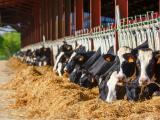Jan 17, 2013
Study finds no rise in fetal death from 2009 H1N1 vaccine
Pandemic 2009 H1N1 (pH1N1) vaccination of pregnant women did not increase the risk of fetal death, according to a study of more than 100,000 women yesterday in the New England Journal of Medicine. In addition, the study of Norwegian women and girls found a rate of fetal death almost twice as high among expectant moms who contracted pH1N1 flu. Among 117,347 pregnancies from 2009 through 2010, immunization with the adjuvanted pH1N1 vaccine Pandemrix during pregnancy reduced the risk of fetal death slightly, but the drop was not statistically significant (adjusted hazard ratio [AHR], 0.88; 95% confidence interval [CI], 0.66-1.17). By comparison, pH1N1 infection in the women increased the risk of fetal death (AHR, 1.91; 95% CI, 1.07-3.41). In addition, the authors found that the vaccine lowered the risk of a doctor's diagnosis of influenza (AHR, 0.30; 95% CI, 0.25-0.34). The report says, "Given the danger posed by maternal influenza virus infection for fetal survival, our study adds to growing evidence that vaccination of pregnant women during an influenza pandemic does not harm—and may benefit—the fetus." A July 2012 study in Dutch women also found no fetal harm from the Pandemrix vaccine.
Jan 16 N Engl J Med study
July 2012 Dutch study
Two H7N3 outbreaks in Mexico affect 20,000 poultry; almost 400,000 to be culled
Two outbreaks of highly pathogenic H7N3 avian flu have hit poultry farms in Jalisco state in Mexico, infecting 20,068 birds, 18,009 of them fatally, according to a report filed with the World Organization of Animal Health (OIE) today. Both outbreaks are located on commercial layer farms near Encarnacion de Diaz in Jalisco and began on Jan 12. In the first outbreak, 10,058 poultry were infected, 8,932 fatally. In the second one, 10,010 birds were infected, 9,077 fatally. The report does not list any poultry as being culled but says, "Both farms are being depopulated." The two farms house about 200,000 chickens each, for a total of 397,513 susceptible birds. Last summer a series of H7N3 outbreaks in Jalisco led to the culling of millions of poultry. The situation had quieted down till last week, when two farms in the adjacent state of Aguascalientes reported the virus, which led to the culling of 300,000 poultry.
Jan 17 OIE report
Jan 9 CIDRAP News scan on previous outbreak
Nepal reports avian flu outbreaks on 4 farms
Nepal has detected an unspecified strain of avian flu on four farms in Kaski district and has culled 2,000 chickens to prevent disease spread, according to a story in Nepal's national newspaper, Republica. Regional health official Dr Bansi Sharma said that lab tests in Nepal and the United Kingdom confirmed avian flu in samples from the farms after chickens had died suddenly. "Our technicians culled 2,000 chickens and destroyed feed kept at the four farms to prevent the disease from spreading," he said. "They also sprayed chemicals in the affected farms."
Jan 16 Republica story



















